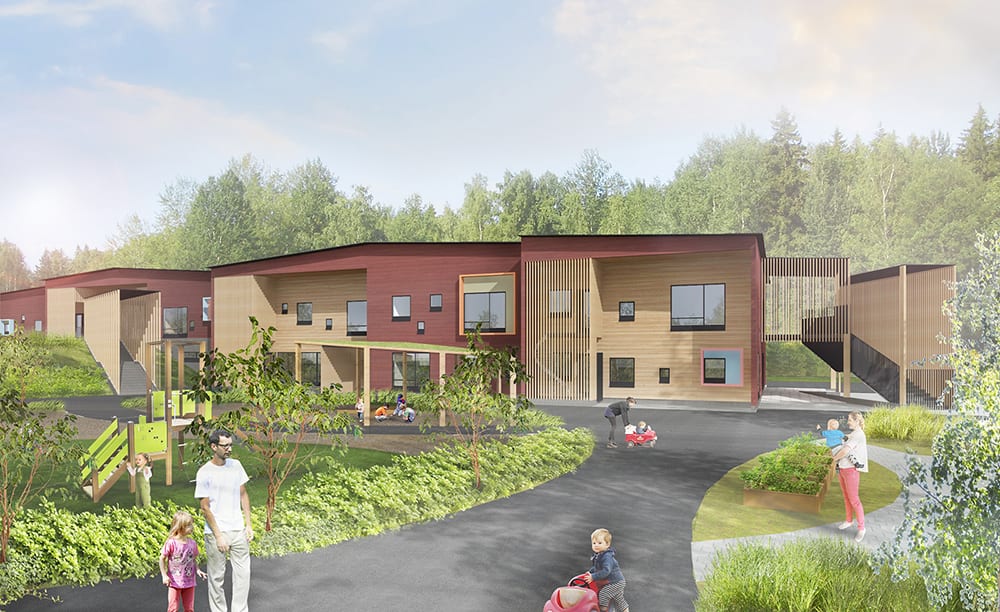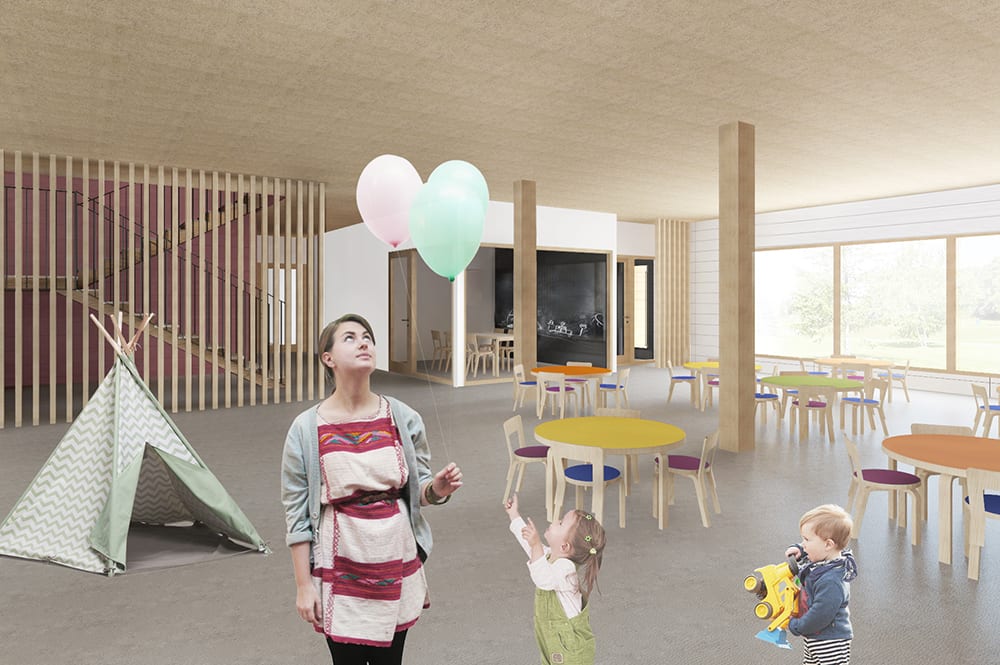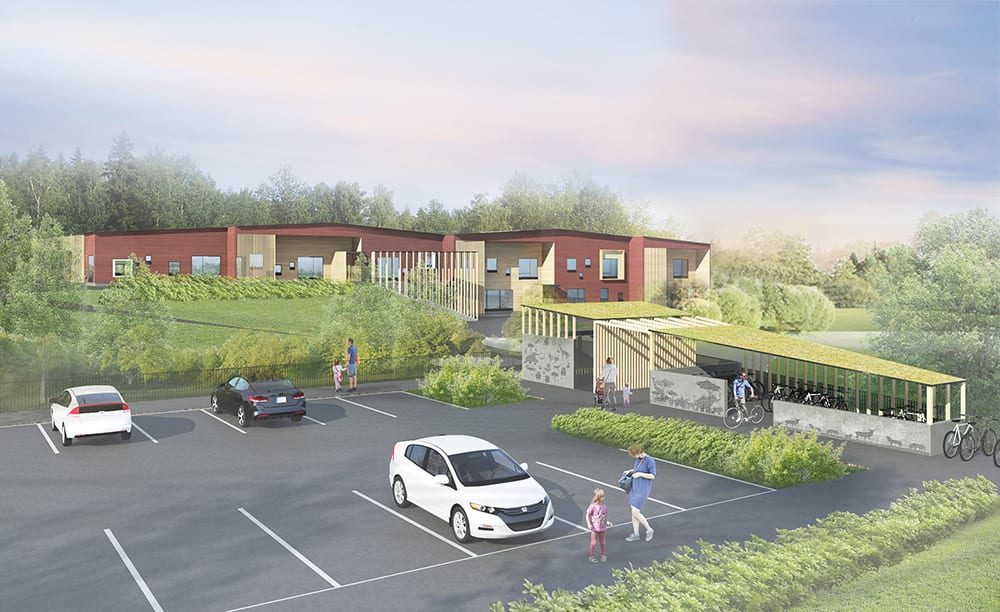PRESS RELEASE HONKARAKENNE Ltd 6 MAY 2021 AT 10.00 AM
A carbon-negative log-structured daycare centre will be built in Vantaa – for the first time in Finland, a daycare centre building will do the climate more good than harm during its life cycle
Municipalities are trying to quickly find more sustainable construction solutions. Finland’s goal is to be carbon neutral by 2035, and the built environment creates up to a third of the country’s greenhouse gas emissions. During the tender process for the Koivukylä daycare centre in Vantaa, carbon footprint was one of the key assessment criteria. The winning proposal was drawn up in collaboration between Hoivarakentajat and Honkarakenne. ‘This sensory-friendly, carbon-negative log-structured solid-wood daycare centre sets the direction for future construction,’ says Tarmo Kemppainen, who acts as managing director at Hoivarakentajat.
Next year, a daycare centre that will do the climate more good than harm will be built in Vantaa, Finland. The carbon footprint of the log building that won the tender is smaller than that of other similar buildings. In addition, as the carbon handprint is larger than the carbon footprint, the climate impact of the proposed building is beneficial.
Carbon handprint refers to positive climate impact. The carbon negativity of the proposed daycare centre means that the building is not only carbon neutral, but also something even better from the point of view of the climate.
‘It’s time to shift the focus to climate benefits and solutions that produce renewable energy in construction,’ says Project Sales Manager Markus Saarelainen from Honkarakenne.
 Log keeps carbon out of the atmosphere
Log keeps carbon out of the atmosphere
‘A complete log building stores carbon throughout its life cycle. At the end of their life cycle, logs can be processed into new wood products and biofuel or used directly in energy production,’ continues Saarelainen.
The Koivukylä daycare centre will be built of Honkarakenne logs that come from certified Finnish forests. As it grows, wood sequesters carbon dioxide, and when logs are used for construction, carbon dioxide remains stored in the structures and away from the natural cycle for as long as the building exists. When maintained properly, a log building lasts for centuries and can be recycled at the end of its life cycle.
The Koivukylä daycare centre is designed to be as energy efficient as possible. Costs are reduced by, e.g. water-saving faucets, smart building technology, energy-efficient lighting, geothermal heating and solar energy. During the tender process, the City of Vantaa compared the carbon footprint calculations of the proposals and had separate measurements made on the impact of the construction period: in the proposal of Hoivarakentajat and Honkarakenne, the carbon dioxide emissions caused by the production, transport and factory processing of raw materials (118 kg/m2) are significantly lower than the average for buildings (250 kg/m2).
According to the calculation made for the proposal, the building’s carbon footprint is 9.52 kg/m2/a. In other words, the building produces 9.52 CO2e kilos of emissions per heated net square metre a year. Correspondingly, the building’s carbon handprint is -10 kg/m2/a. This means that when the building is built, a calculated amount of 10 CO2e kilos of emissions per heated net square metre a year will not be realised.
The City of Vantaa aims to be carbon neutral by 2030, five years earlier than Finland as a whole. In Vantaa, urban planning is guided by the roadmap to resource wisdom drawn up by the City, in which one of the proposed actions is the promotion of wood construction.
‘The proposal for the Koivukylä daycare centre is a good example of how we are combatting climate change and making an effort to create a healthy and sustainable urban environment,’ describes Juha Vuorenmaa, who works as a construction manager for the City of Vantaa. ‘In accordance with our strategy, environmental values must influence decision-making. That’s why we tested measuring the carbon footprint of the proposed daycare centre buildings as part of tender evaluation. As a material, Finnish log meets our requirements well.’
Happy children, parents and personnel
Before the Koivukylä project, Hoivarakentajat and Honkarakenne had realised 20 log-structured early childhood education environments in collaboration with Pilke Daycare Centres. They have also built log schools and care and service apartments in collaboration. Users’ experiences of log-structured daycare centres have been very positive. Particularly healthy indoor air and sensory friendliness have been commended by the users. The music-oriented daycare centre Nuotti in Siilinjärvi and the science-oriented daycare centre Siru in Leppävaara, Espoo, are examples of the results of the collaboration.
‘Here, indoor air is fresh and smells of wood, and the acoustics are really good. The sounds don’t bounce off the log walls but seem to be absorbed by them instead, which reduces the noise level and makes the building more comfortable to work in,’ describes Maiju Kauppinen, who works as a director at Nuotti. ‘Parents are particularly interested in indoor air quality, and they have been really happy with our facilities.’
Deputy director Mira Vaalavuo from the Espoo-based daycare centre Siru also comments on the daycare centre as a working environment: ‘The log building does indeed have an impact on personal wellbeing.’
The Honkarakenne log is an antibacterial natural material that naturally evens out fluctuations in air humidity. ‘The value judgements made by municipalities are also increasingly reflected in the construction of daycare centres. The Koivukylä daycare centre in Vantaa is a good example of how responsible operators can ensure a healthy and safe environment for growth, learning and work,’ points out Tarmo Kemppainen, the managing director of Hoivarakentajat.
Public buildings are increasingly made of wood
Wood construction is increasing due to the climate policy decisions made by the state and municipalities. It is the goal of the Finnish Ministry of the Environment that the market share of wood construction of all public construction be almost one third in 2022 and 45% in 2025. In addition, new assessment criteria for evaluating low-carbon construction are being prepared. According to the Ministry of the Environment, providing emission calculations for the entire construction process already in the building permit phase will be mandatory in Finland by 2025.
Additional information and interview requests:
Images / Arkkitehtuuri Oy Lehtinen Miettunen
Mikko Vainioranta, Chief Marketing Officer, Hoivarakentajat
tel. +358 40 701 5325, mikko.vainioranta@hoivarakentajat.fi
Markus Saarelainen, Project Sales Manager, Honkarakenne
tel. +358 40 596 6007, markus.saarelainen@honka.com
Honkarakenne Ltd supplies healthy and ecological high-quality log homes, holiday homes and public buildings. Its buildings are made from Finnish solid wood under the Honka® brand. The company has delivered 85,000 buildings to over 50 countries. We manufacture our home packages in Finland, at our own factory located in Karstula. In 2020, Honkarakenne Group’s consolidated net sales totalled EUR 52.9 million, of which exports accounted for 30%. www.honka.com
Hoivarakentajat Oy is a construction company specialising in carbon-neutral and sensory-friendly daycare centres, schools and service apartments. Together with our customers, we build responsibly and sustainably, taking account of the wellbeing of people and the environment. We have noticed that when a building is gentle on the senses, everyone finds it comfortable and easy to breathe in.
We build new facilities or create new business for our customers under design and build contracts and lease agreements. Hoivarakentajat Oy is the largest builder of log buildings in Finland. We have built over 100 healthy, sensory-friendly buildings to support the growth of our customers’ business. Most of the projects have been implemented using Finnish logs. The net sales of Hoivarakentajat Oy amount to approximately EUR 30 million. www.hoivarakentajat.fi



